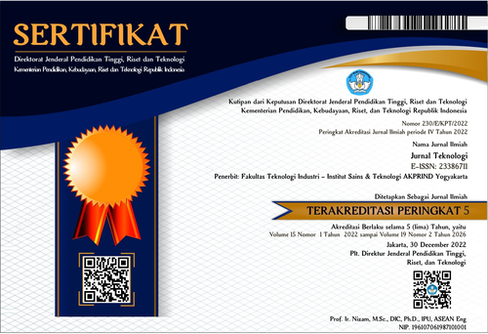Optimalisasi Pengisian Accu Pada Sistem Pembangkit Listrik Tenaga Surya (PLTS) Dengan Solar Charge Controller (MPPT)
DOI:
https://doi.org/10.34151/jurtek.v15i1.3929Keywords:
accu, MPPT solar charge controller, renewable energy, solar energyAbstract
The use of renewable energy is currently one of the alternative energies to support the decline in fossil energy in Indonesia. Solar energy is the right choice for now, as a solar power plant (PLTS), which is a renewable technology, which can convert solar thermal energy into electrical energy. The solar power generation system has various components, one of which is the Solar charge controller. The purpose of this research is to optimize battery charging using the MPPT Solar charge controller type. MPPT solar charge controller, has better characteristics and is able to charge the battery (accu) faster. In this study also pay attention to the effect of light intensity and temperature on the power output generated by the solar cell. The results showed that the MPPT Solar charge controller was able to work better and faster in charging the battery (accu) than other Solar charge controllers. It is proven by the results of the average voltage, current and output power of the MPPT controller of 13.79 volts, 3.06 amperes and 42.26 watts of power, for high light intensity and temperature do not always affect the results of high voltage, current and power, because environmental factors also affect the output of the solar cell.
Downloads
References
Arisfati Fauzi, Ayong Hiendro, Syaifurrahman, 2019, Rancang Bangun Battery Control Unit Panel Surya Terhadap Efek Bayangan, Jurnal Teknik Elektro Untan, Vol 2 No 1.
Dini Khusnul Yaqin., 2019, Rancang Bangun Charge Controller Panel Surya Dengan Menggunakan Sistem Fast Charging, Jurnal Teknik, Vol 1, No 1.
Geny Jati, 2021, Pemetaan Potensi Energi Terbarukan di Indonesia untuk Perencanaan Transisi Energi yang Lebih Tepat, https://iesr.or.id/pemetaan-potensi-energi-terbarukan-di-indonesia-untuk-perencanaan-transisi-energi-yang-lebih-tepat
Jaganthan S, Gao W. 2009. Battery charging power electronics converter and control for plug-in hybrid electric vehicle. Vehicle Power and Propulsion Conference, 2-9.
M. A. Laguado-Serrano, E. A. Luna-Paipa, L. F. Bustos-Marquez, S. B. Sepulveda-Mora, 2019. Performance Comparison Between PWM and MPPT Charge Controllers, Scientia et Technica Año XXIV, Vol. 24, No. 01, Universidad Tecnológica de Pereir
Made A, Satwiko S. 2011. Studi Rancang Bangun Solar Charge Controller Dengan Indikator Arus, Tegangan dan Suhu Berbasis Mikrokontroler ATMEGA 8535. Program Studi Fisika, Jurusan Fisika, FMIPA, UNJ.
Mahardika A, Wijaya A, I Wayan R. 2016, Rancang Bangun Baterai Charge Control Untuk Sistem Pengangkat Air Berbasis Arduino Uno Memanfaatkan Sumber PLTS. Jurnal SPEKTRUM, Vol 1 No 1.
Muhammad Suyanto, Beny Firman, Adhitya Wisnu Jatmiko, 2017, Micro-Solar Power Plant with Capacity of 900 Watt for Power Supply of Rural Village Information System, International Journal of Engineering Research & Technology (IJER), Vol. 6 No 03.
N. Wananda., (2019). Analisa Perbandingan Optimasi Pengisian Daya Baterai (Accu) Pada Pltb Dan Plts Menggunakan Solar Charge Controller Tipe PWM Dan MPPT, Teknik Elektro, Universitas Muhammadiyah Sumatera Utara.
Downloads
Published
How to Cite
Issue
Section
License
Copyright (c) 2022 Suyanto Muhammad

This work is licensed under a Creative Commons Attribution 4.0 International License.
Jurnal Teknologi provides immediate open access to its content in order of making research freely available to the public to support a global exchange of knowledge. All articles published in this journal are free for everyone to read and download, under licence CC BY SA.
Benefits of open access for the author, include:
- Free access for all users worldwide.
- Authors retain copyright to their work.
- Increased visibility and readership.
- No spatial constraints.




















